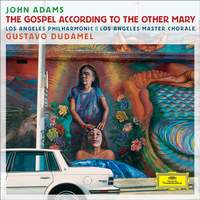Recording of the Week,
Gustavo Dudamel conducts a new oratorio by John Adams
John Adams is one of my favourite living composers, and so a new piece by him is always cause for excitement. Released today is the first recording of his two-act oratorio from 2012, The Gospel According to the Other Mary, with Gustavo Dudamel conducting the Los Angeles Philharmonic. Although essentially a Passion narrative, telling the story of Jesus’s arrest, trial, and crucifixion, as its title suggests it focuses not on Jesus or his mother but instead on Mary Magdalene and her sister Martha.

The libretto is by Adams’s frequent collaborator, Peter Sellars, and what may make this piece controversial for some is its juxtaposition of Biblical excerpts with contemporary texts to create a story that operates on two timescales simultaneously. Just as in Adams’s earlier opera, The Death of Klinghoffer, in which Old Testament and Koranic stories move directly into graphic images of news events, here the action switches between the traditional story and a contemporary one in which Martha helps to run a house for unemployed women. Indeed, the piece begins with an excerpt from the autobiography of American social activist, Dorothy Day, who describes a night in jail, hearing in the next cell “a drug addict who beat her head against the bars or against the metal walls of her cell and howled like a wild animal”.
It’s certainly an arresting opening; the frequent time-jumps may not work for everyone, but personally I found the texts to be very cleverly-chosen. I particularly loved the poems by Louise Erdrich, including one sung by Mary Magdalene (“I wash your ankles with my tears”), and the chorus that begins Act Two, in which Erdrich envisions Jesus getting down from his own cross and chopping it down with an axe.
One of the most outstanding passages is the extended scene in Act One involving Lazarus’s death and resurrection, which has inspired some of Adams’s most imaginative orchestral colours, from the swirling, pulsing woodwinds and slowly-moving strings in octaves representing Lazarus’s death, to Jesus’s arrival at Lazarus’s grave (“Take ye away the stone”), where the removal of the stone is depicted with a pitch-bend effect from oboe and bassoon that sounds truly eerie. Perhaps the most astonishing part, though, is Lazarus’s resurrection itself, where wailing glissando strings sound like a grotesque siren as the corpse comes back to life. Combined with horrified chanting from the chorus, it’s a chilling moment.
Singing the role of Lazarus is American tenor, Russell Thomas, and he excels in his virtuoso, post-resurrection showpiece, “For the grave cannot praise thee”. Much of it lies extremely high, but Thomas gives us a fearless performance. He also concludes Act One with a setting of a Passover prayer by Primo Levi, “Tell me: how is this night different”. Here, as well as at the very end of the piece, Adams treats us to some of his most tender, ravishing music.
Another feature that sets it apart from most Passion settings is that, if you look at the list of singers, there is no Jesus: his words are instead sung by other characters, most often by a trio of countertenors. The sound of the three of them together is quite extraordinary, and provides many beautiful passages: for example, at the very end of the Golgotha scene, when Jesus sees his mother standing by the cross, they repeatedly sing “behold thy son”, to a gentle accompaniment of oboe and shimmering string chords. It’s a most affecting moment, greatly enhanced by the countertenors’ plaintive cry.
So, I really think this is one of Adams’s most impressive recent pieces. With excellent performances from Kelley O’Connor as Mary Magdalene and Tamara Mumford as Martha, and incredible orchestral playing, I recommend it most highly!
Kelley O'Connor (Mary), Tamara Mumford (Martha), Russell Thomas (Lazarus), Daniel Bubeck, Nathan Medley, Brian Cummings (countertenors), Los Angeles Philharmonic & Los Angeles Master Chorale, Gustavo Dudamel (Download not available in all countries)
Available Formats: MP3, FLAC, Hi-Res FLAC



